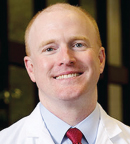
Theodore Laetsch, MD
Pediatric hematologist-oncologist Theodore Laetsch, MD, has joined the Division of Oncology at Children’s Hospital ofPhiladelphia (CHOP), where he will launch a cutting-edge Very Rare Malignant Tumors Program that will seek to develop new treatments for children with rare and complex tumors. In addition to leading this new program, he will also direct CHOP’s Developmental Therapeutics Program and become the CHOP Primary Investigator of the National Cancer Institute Pediatric Early Phase Clinical Trials Network.
With this appointment, Dr. Laetsch has come full circle to the site of his training. He completed his fellowship in pediatric hematology-oncology at CHOP in 2012 and served as Instructor from 2012 to 2013. He then spent seven years at the University of Texas Southwestern and Children’s Medical Center in Dallas, where he was promoted to Associate Professor of Pediatric Hematology-Oncology and directed the Experimental Therapeutics Program in the Center for Cancer and Blood Disorders at Children’s Health.
Leader in Pediatric Cancer Initiatives
As a national leader in pediatric cancer therapeutics, treatment, and research, Dr. Laetsch sits on multiple national committees related to these disciplines. In 2018, he played a key role in the development and U.S. Food and Drug Administration approval of larotrectinib, a novel treatment for adults and children with solid tumors, containing neurotrophic receptor tyrosine kinase gene fusions.
In 2019, the Children’s Oncology Group appointed Dr. Laetsch Chair of the Rare Tumors Committee. He has also been involved in national trials of chimeric antigen receptor (CAR) T-cell therapy, including acting as an institutional principal investigator in the ELIANA trial, the first global and pivotal trial of CAR T-cell therapy. Dr. Laetsch has continued to be a leader in pediatric CAR T-cell therapy, and he led the analysis of its effects on the quality of life in children and young adults with relapsed or refractory B-cell acute lymphoblastic leukemia.

